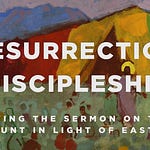Lord Jesus Christ, we admit we don’t always know how to talk to you.
We’ve made prayer into a performance, a script to get right, a ladder to climb to some spiritual success. We’ve folded our hands and bowed our heads so tightly we’ve choked the life out of what you meant to be a living conversation.
But you didn’t teach us a technique.
You gave us a prayer.
Not to impress others.
Not to impress you.
Just enough words to carry us when we have none.
Just enough trust to believe you’re still listening.
So give us the courage this morning to drop the act.
Help us stop praying like people who think you’re far away.
Help us stop praying like hypocrites who want to be seen more than they want to see you.
Give us the grace to pray like people who know the tomb is empty.
To pray like those who’ve already been heard.
Our Father. Yours is the Kingdom.
Yours is the power.
Yours is the glory.
And we’re just trying to remember that.
Amen.
One of the first things children learn to do in church is how to pray. Hands folded, head bowed, and eyes closed. I know it warms many of your hearts, because it warms mine, to see the children of our church praying every Sunday. Their prayers are earnest and not yet contaminated by the cynicism of adulthood. Their prayers are proof that there is life in this congregation.
But as our children grow up, they also learn that prayer can become performative.
I remember a time when I was a child, not praying with the prescribed posture (hands folded, head bowed, eyes closed) during a moment of congregational prayer. I was looking around the grand sanctuary at Calvary United Methodist Church as our pastor prayed.
My eyes met the glare of a fellow worshipper who did not appreciate my inquisitive wandering. With very deliberate, nonverbal gestures, I was directed to stop looking around and assume the correct position.
A prescribed position I now realize was not being followed by my fellow worshipper.
Assume the correct position.
Say the right words.
And for heaven’s sake, keep your words reverent.
If you don’t mess up those three things, many have been told, your prayers will be heard.
But in the middle of the Sermon on the Mount, Jesus flips what we thought we knew about prayer.
He’s not offering a technique.
He’s not grading performance.
He’s inviting us out of an act and into a conversation.
“When you pray,” Jesus said, “don’t be like the hypocrites. They love to stand in the synagogues and on the street corners so they can be seen.”
The point isn’t that public prayer is bad. The point is that in everything we do, drawing attention to ourselves is not the goal.
Dietrich Bonhoeffer put it like this:
“Genuine prayer is never ‘good works,’ an exercise or pious attitude, but it is always the prayer of a child to a father… Prayer is the supreme instance of the hidden character of the Christian life.”
If your prayer is more about being heard by them than by Him, it’s already off the rails.
The temptation to make religion into a Broadway show is something many of us (especially pastors) find difficult to resist. If there’s a spotlight, we tend to find our way into it—even if that means turning a quiet time into performance art.
But here’s the good news: because Christ lives, risen and ascended, we don’t need to audition.
We are praying to a God who already knows, sees, and loves.
So if prayer is not a performance, what is it?
Jesus said,
“Go into your room. Close the door.”
That’s not a divine command to build a larger prayer closet. It’s an invitation to drop the act.
A call to go to God with the real stuff.
Health. Healing. Wholeness.
Peace. Provision. Providence.
Our prayers are not small talk with a distant deity. They are our earnest, even desperate, pleas for the Kingdom of God to come.
Bonhoeffer again:
“God’s name, God’s kingdom, God’s will must be the primary object of Christian prayer… God uses their prayers to hasten the coming of the End.”
We don’t pray to get something.
We don’t pray to be rewarded.
We pray because Christ has already given everything.
The reward, if you’re looking for one, is not spiritual success.
It’s not religious status.
It’s not certainty.
The reward is God.
The Father sees.
The Son intercedes.
The Spirit groans.
And that means even when our prayers feel dry, distracted, or delayed… they are heard.
Because Christ is risen,
Because Christ is ascended,
Our prayers are not flung into the void.
They are gathered into the life of God.
So:
Don’t pray like God is far away.
Don’t pray like no one’s listening.
Don’t pray like someone auditioning for a part.
Pray like the tomb is empty.
Pray like the Son is alive.
Pray like someone who’s already been heard.
Pray like someone who’s been handed a gift and told,
“When you don’t know what to say, try saying, Our Father…”
And when you don’t know what else to pray?
Pray it again.
Pray it by heart.
Pray it until it shapes you.
Because Christ lives,
our prayers are heard.
















Share this post